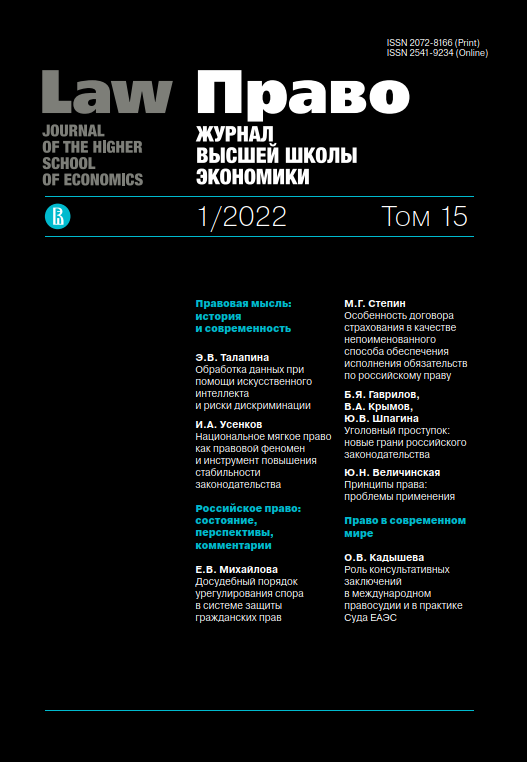Защита прав субъектов от нарушений антимонопольного законодательства в порядке гражданского судопроизводства в США
Аннотация
Американское антимонопольное регулирование представляет собой достаточно сбалансированную систему правовых норм и судебных прецедентов, позволяющую частным лицам наряду с государственными органами активно участвовать в правоприменительной деятельности, способствуя тем самым как защите своих прав, так и пресечению соответствующих нарушений законодательства. В контексте прилагаемых Евросоюзом и Россией усилий по развитию частного антимонопольного правоприменения изучение американского опыта в данной сфере позволит определить возможные направления совершенствования российского законодательства. Предметом проведенного исследования является антимонопольное и гражданско-процессуальное законодательство США, прецедентные решения судебных органов, составляющие основу системы судопроизводства по искам, заявляемым в связи с нарушениями антимонопольных норм. Целью настоящей работы выступает определение основных особенностей американского антимонопольного регулирования и правоприменения, способствующих активному участию частных субъектов в противодействии антиконкурентному поведению, проведение сравнительного исследования положений законодательства США и России, касающихся способов защиты прав лиц от монополистической деятельности, и предложение возможных направлений развития российского антимонопольного регулирования. В работе используется методология формально-логического анализа и сравнительного правоведения, что позволяет раскрыть юридическую сущность тех или иных способов защиты гражданских прав, а также выявить особенности гражданского судопроизводства по антимонопольным искам. В результате изучения темы сделан вывод о возможности совершенствования российского антимонопольного законодательства, исходя как из опыта правового регулирования США, так и с учетом основополагающих принципов российского гражданского права. Так, для развития частного правоприменения в сфере защиты конкуренции предлагается установить штраф за несоблюдение в добровольном порядке обоснованных требований потерпевшего либо ввести компенсацию за нарушение антимонопольного законодательства, взяв за ее основу, например, размер прибыли правонарушителя за соответствующий период. Также в работе сделан вывод, что существующая в настоящее время в США система групповых исков является более эффективной с точки зрения стимулирования частного правоприменения, чем предусмотренная российским процессуальным правом.
Литература
Abolonin G.O. (2015) US class action legal procedure. Vestnik grazhdanskogo processa=Civil Process Review, no 3, pp. 169-252 (in Russ)
Bahaeva A.V. (2015) Specifics of Compensation for Antitrust Damages in the United States. Zakony Rossii: opyt, analiz, praktika=Russian laws: experience, analysis, practice, no 8, pp. 74-78 (in Russ.)
Baker D. (2004) Revisiting History — What Have We Learned about Private Antitrust Enforcement That We Would Recommend to Others? Loyola Consumer Law Review, vol. 16, iss. 4, pp. 379-408.
Berlyavskij L.G. (2017) Formation of antitrust legislation in the United States. Konkurentnoe pravo=Competition Law, no 2, pp. 9-12 (in Russ.)
Borzova M.A., Podguzova K.G. (2013) Private Actions in Antitrust Law. Zakon=Statut, no 7, pp. 61-68 (in Russ.)
Budylin S.L. (2013) Penalty damages. Now in Russia? Vestnik grazhdanskogo prava=Civil law Bulletin, no 4, pp. 19-51 (in Russ.)
Crane D. (2010) Optimizing Private Antitrust Enforcement. Vanderbilt Law Review, vol. 63, no 2, pp. 675-723.
Dabbah E. (2019) The journey from theory to practice in the field of competition law. Journal of Antitrust Enforcement, vol. 7, iss. 2, pp. 137-157. DOI: https://doi.org/10.1093/jaenfo/jnz007
Egorova M.A. (2017) Problems in the enforcement of perse prohibitions at the present stage. Pravo i ekonomika=Law and Economy, no 6, pp. 5-14 (in Russ.)
Egorova M.A., Kinev A.YU. (2015) Restorative antitrust compensation. Predprinimatel'skoe pravo=Business Law, no 2, pp. 30-35 (in Russ.)
Foer A., Cuneo J. (ed.). (2012) The International Handbook on Private Enforcement of Competition Law. Cheltenhem: Edward Elgar Publishing Limited, 656 p.
Huffman M. (2018) Incentives to Comply with Competition Law. Loyola Consumer Law Review, vol. 30, iss. 2, pp. 108-120.
Kinev A.Yu. (2014) Cartels and other anti-competitive agreements. SPS Konsul'tant-Plyus (in Russ.)
Kovaleva O., Galeev B. (2013) Why is Russia not America? About new collective remedies in antitrust law. Konkurenciya i pravo=Competition Law, no 4, pp. 40-49 (in Russ.)
Kovacic W. (2003) The modern evolution of U.S. competition policy enforcement norms. Antitrust Law Journal, no 2, pp. 377-478.
Kulik YA. (2013) What you need to protect against monopolies and cartels. Konkurenciya i pravo=Competition Law, no 5, pp. 15-19 (in Russ.)
Lancieri F. (2019) Digital protectionism? Antitrust, data protection, and the EU/US transatlantic rift. Journal of Antitrust Enforcement, vol. 7, iss. 1, pp. 27-53. DOI: https://doi.org/10.1093/jaenfo/jny012
Molchanov A.V., Lobanov R.M. (2018) Compensation for Damages Caused by Violation of Antimonopoly Legislation. Zhurnal predprinimatel'skogo i korporativnogo prava=Journal of Business and Corporate Law, no 4, pp. 42-47 (in Russ.)
Pogodina I.V., Markova E.S., Averin A.V. (2016) Development of antitrust laws in the United States. Administrativnoe i municipal'noe pravo=Administrative and Municipal Law, no 9, pp. 746-749 (in Russ.)
Posner R. (2001) Antitrust law. Chicago: University Press, 304 p.
Reshetnikova I.V. (2019) Reflecting on Judicial Proceedings. Moscow: Statut, 510 p. (in Russ.)
Rodger B. (2013) Why not court? A study of follow-on actions in the UK.Journal of Antitrust Enforcement, vol. 1, iss. 1, pp. 104-131. DOI: https://doi.org/10.1093/jaenfo/jns001
Rudomino V., Numerova A. (2010) Private actions in antitrust law: theory and practice of application in Russia. Korporativnyj yurist=Corporate lawyer, no 5, pp. 47-51 (in Russ.)
Starikov A.V. (2020) Civil means of protection against violations of antimonopoly legislation. Vestnik ekonomicheskogo pravosudiya Rossijskoj Federacii=Russian Federation Economic justice Bulletin, no 5, pp. 72-135 (in Russ.)
Starikov A.V. (2020) Civil means of protection against violations of antimonopoly legislation. Vestnik ekonomicheskogo pravosudiya Rossijskoj Federacii=Russian Federation Economic justice Bulletin, no 6, pp. 48-78 (in Russ.)
Toal M. (2014) The Future of Class Actions in the Wake of Comcast v. Behrend. Loyola Consumer Law Review, vol. 26, iss. 3, pp. 545-577.
Zhurbin B.A. (2008) Class and derivative actions in judicial practice. SPS Konsul'tant-Plyus (in Russ.)
Zvier P., Yarkov V.V. (2020) Class actions in the legal history of the United States and Russia: in search of the optimal model. Vestnik grazhdanskogo processa=Civil Process Bulletin, no 1, pp. 143-197 (in Russ.) DOI: https://doi.org/10.24031/2226-0781-2020-10-1-143-197
Copyright (c) 2022 Право. Журнал Высшей школы экономики

Это произведение доступно по лицензии Creative Commons «Attribution-ShareAlike» («Атрибуция — На тех же условиях») 4.0 Всемирная.


















